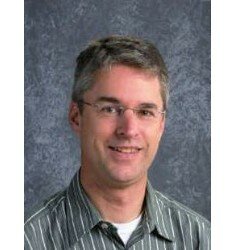The “Interview with a Christian School Librarian” is a series that features Christian school librarians and school library staff (both active and retired) from all over the world. The goal of this series is create a sense of community among Christian school librarians and to share our professional wisdom.
Bruce Cummings

Bruce Cummings is the teacher librarian at Davis High Senior School in Davis, California.
How long have you worked in libraries and how did you get your start?
I started in 1995, shortly before I received my MLIS at San Jose State University. Anticipating the completion of my degree program, and in a job that barely paid a living wage, I responded to a job posting for library media teacher at El Camino High School in South San Francisco. I was drawn to the position partly because of a family tradition of teaching (I’m a third generation teacher from both parents). I still had more classes to take for the credential process, which I address in the “biggest challenge.”
What is the most enjoyable part of your job?
I enjoy working with students at the secondary level, and I particularly enjoy seeing students experience the joy of discovery, especially if it is of something that is of personal importance to the student (as opposed to a school assigned topic).
What is the biggest challenge?
Going through the process to get a single subject credential, then the library credential, was a bit tedious, but I ultimately embraced it. I think the greatest work challenge is persuading teachers (and students) of the lasting value of the skills I teach. While a single visit to the library may be life changing for a few, in my experience it is the repeated practice of essential skills that bears the most proficient fruit. This tends to be at odds with the “instant results” mentality that so often seems to be governing how schools are evaluated.
What advice would you give to someone just starting off?
Make sure you love what you do, especially in California, which is downright hostile to school librarians. Apart from that, see yourself in a support role for everybody at the school–students, teachers and administrators. Look to expand your influence (with appropriate boundaries!) rather than limit it. My greatest success stories are with those who are the “last, least, lost” groups, like new teachers, and teachers of challenging student populations (such as special ed and English language learners). I rarely see Advanced Placement classes in the library.
Brag a bit! Tell me about the best thing you’ve done at your library. Did you implement a program, a policy, or create something you’re proud of?
By following my advice (above), I embraced a “School to Career” (STC) curriculum in South San Francisco. The early recruits dreaded writing the curriculum, and I invited myself to their meetings. I became the STC coordinator a few years later. It was attached to the English and Social Studies departments, but each grade (9-12) had a unit, which had part or all of its STC curriculum in the library. It became a great vehicle for me to teach information literacy skills, but connected to content, rather than in isolation. That probably impacted the greatest number of students. But I’ve also been instrumental in helping the special education program to explain itself to the rest of the school, and in promoting the use of effective teaching strategies with special needs students to all students.
What are some of the issues you deal with that you feel are unique to Christian school librarians?
I can’t really think of issues that would be unique to Christian school librarians, except in how they are handled. I am mindful that when I am “on duty,” I am an agent of the state, and usually with a captive audience. I cannot proselytize. However, I can encourage students to seek out information from a variety of sources, which may include Biblical sources or Christian organizations.
Do you have any thoughts on how Christian librarians in secular schools can be lights for Christ while adhering to workplace rules about sharing our faith?
I will sometimes refer to myself when helping students unpack a controversial issue they are researching, especially where values are being examined. Many students need help looking at “contrary evidence” to avoid setting up a straw man argument. Students who find themselves either in sympathy with a Christian position, or opposed to it, find they cannot merely declare their position “right” by fiat. By seeing an adult willing to discuss values without becoming defensive, students can approach difficult topics with more humility and thoughtfulness. I hope through this to give Christian students a deeper understanding of a viewpoint they may have “inherited.” And for non-Christians, they learn that Christian viewpoints cannot be easily dismissed, at least if intellectual integrity matters to them. I have also been the faculty advisor for a student Christian club, although I don’t see that as a role unique to school librarians. My discussion has been in the context of students, but by supporting the “last, least and lost” among my colleagues, I have had a positive impact there, as well.
Many thanks to Bruce for taking the time to answer my questions and share his thoughts! If you’d like to be interviewed for this series, click here to let me know about your interest!

